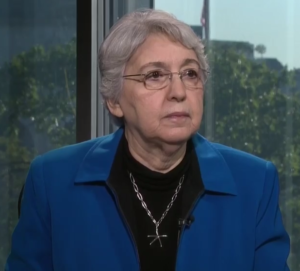Humanist Women in History: Eleanor Smeal
March is Women’s History Month in the United States, the UK, and Australia. In commemoration we bring you the final installment of this year’s four-part series, Humanist Women in History. Read last week’s profile on Barbara Ehrenreich here, along with earlier profiles of Alice Walker and Mathilde Krim. Last year’s five-part series is here.
“Move over a little more gracefully, boys!”
—Eleanor Smeal, responding to those who reportedly weren’t thrilled with the idea of Katie Couric being the sole anchor of the CBS Evening News when it was announced in 2006.

Eleanor Smeal (screengrab via C-SPAN)
Eleanor Smeal, born on July 30, 1939, in Ashtabula, Ohio, has been one of the foremost proponents of women’s rights in the United States. Her activism started upon her arrival in 1957 at Duke University, where she fought for integration. She received an honorary law degree from Duke and also has a master’s in political science from the University of Florida.
Smeal joined the National Organization for Women (NOW) in 1970 after attending a large conference at Point Park College in Pittsburgh, Pennsylvania, to celebrate the fiftieth anniversary of women’s right to vote. When she saw the news coverage of the convention, she was outraged: “The eleven o’clock news made the whole conference look like we were absolutely stark raving crazy. That was the day I said, ‘I’m joining NOW. With these kinds of misstatements and lies they need all the help they can get.’” She later became the president of the organization and served from 1977-82 and again from 1985-87.
In 1986 Smeal organized the first national abortion rights demonstration. One hundred thousand women’s rights activists marched on Washington, DC, demanding to have their opinions heard. She also led the largest nationwide grassroots and lobbying movement in the history of the women’s rights movement to pass the Equal Rights Amendment. She stood up for women’s political participation and was the first to identify in her 1984 book, How and Why Women Will Elect the Next President, the concept she called the “gender gap”—the differences in the way women and men vote. She highlighted the concept in election and polling analyses to enhance women’s voting clout.
After leaving NOW in 1987, Smeal started the Feminist Majority Foundation (FMF). She has made many important legislative contributions with this group, including the Free Access to Clinic Entrances legislation, the Pregnancy Discrimination Act, the Violence Against Women Act, and the Civil Rights Act of 1991. She has helped to change American culture by working to integrate little league baseball teams and motivate women to make positive changes in their lives. In 2001 FMF took control of Ms. magazine and Smeal came aboard as publisher.
In the area of women and medicine, Smeal also helped bring attention to the drug mifepristone (still commonly referred to as RU-486). After a twelve-year struggle for the drug’s release, the FDA finally approved its’ use for early term abortions in 2000. Smeal continued to fight for testing of the drug on breast and ovarian cancer. “I never could have believed when we started on this journey in the sixties and seventies that we could have an opposition that would even politicize cancer research,” Smeal laments. “And that they’ve gotten away with it.”
Both FMF and Smeal have received much recognition, and Smeal has appeared on most network news and talk shows, also taking on right-wing hosts like Pat Robertson and Bill O’Reilly. She has testified before Congress on a variety of women’s issues and is a public speaker for many varied audiences. Some of Smeal’s most notable awards include being named one of Time magazine’s “50 Faces for America’s Future” and one of U.S. News & World Report’s most influential Washington lobbyists.
In 1994 the Freedom From Religion Foundation honored her with its Freethought Heroine Award. “We went to church every Sunday,” she said in her acceptance speech, recalling her childhood. “And every Sunday my father’s habit was to count how many times they passed the hat. Frankly, I think I learned in that period the importance of separation of church and state. Discrimination on the basis of ethnicity and religion is a very serious quarrel with me.” The Feminist Caucus of the American Humanist Association named her its 2008 Humanist Heroine for all of her work and dedication to women’s rights, and in 2015 Smeal was inducted into the National Women’s Hall of Fame.
